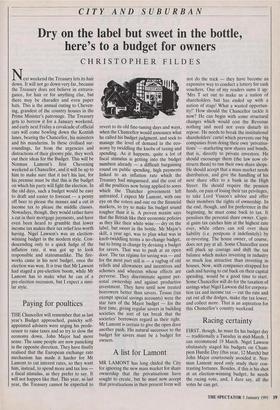A list for Lamont
MR LAMONT has long chided the City for ignoring the new mass market for share ownership that the privatisations have sought to create, but he must now accept that privatisations in their present form will not do the trick — they have become an expensive way to conduct a lottery for cash vouchers. One of my readers sums it up: `Mrs T set out to make us a nation of shareholders but has ended up with a nation of stags! What a wasted opportun- ity!' How should the Chancellor tackle it now? He can begin with some structural changes which would cost the Revenue nothing and need not even disturb its repose. He needs to break the institutional shareholders' cartel which prevents our big companies from doing their own `privatisa- tions' — marketing new shares and bonds, that is, directly to private investors. He should encourage them (the law now ob- structs them) to run their own share shops. He should accept that a mass market needs distribution, and give the handling of his next share offer to a bank in the High Street. He should require the pension funds, on pain of losing their tax privileges, to take Lord Vinson's advice and offer their members the rights of ownership. In the end, though, and for preference in the beginning, he must come back to tax. It penalises the personal share owner. Capit- al gains tax catches him at the highest rate ever, while others can roll over their liability (i.e. postpone it indefinitely) by re-investing. The house owner, of course, does not pay at all. Some Chancellor soon will pluck up courage and shift the tax balance which makes investing in industry so much less attractive than investing in houses. Now, with companies strapped for cash and having to cut back on their capital spending, would be a good time to start. Some Chancellor will do for the taxation of savings what Nigel Lawson did for corpora- tion tax and income tax — cut the rate and cut out all the dodges, make the tax lower, and collect more. That is an aspiration for this Chancellor's country weekend.










































 Previous page
Previous page